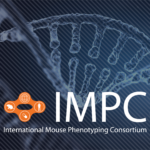The IMPC/KOMP Annual Meeting went virtual this year, hosted by the NIH/NHGRI from Bethesda. It was a great success, with members tuning in for updates and discussions across the globe. Every year, three IMPC Awards of Excellence are presented at the end of the annual meeting to celebrate individuals who have made outstanding contributions and given exceptional service to the consortium.
The joint winners of the first award were Colin Fletcher and Oleg Mirochnitchenko in celebration of their continued efforts in supporting and ensuring the IMPC’s key mission and aims.

Colin Fletcher has been the Program Director for the Knockout Mouse Project (KOMP/KOMP2) since its beginning in 2006 and has been working in mouse genetics since 1989. Colin is ever active in all aspects of the IMPC, managing to oversee, direct and support the NIH KOMP2 programme, which is a fundamental component of the IMPC global effort. He is a voice of reason within the consortium, providing valuable insight, no matter the topic, and a clear and strong passion for mouse genetics.

Oleg Mirochnitchenko is a Program Director at the Office of Research Infrastructure Programs (ORIP), NIH. Together with Colin Fletcher, Oleg has also been instrumental in guaranteeing the success of the KOMP2 programme, ensuring that the programme is afforded the awareness and attention across the NIH that is fundamental to its success. Both Colin and Oleg massively contribute to the coordination of the KOMP and the wider IMPC consortium.
“I am extremely grateful to be working with such talented and productive people. Everyone makes a contribution, and together it adds up to a high impact program. It has exceeded everything I imagined 15 years ago when I wrote up the first set of RFAs! Methods and approaches evolve, but the fundamental knowledge generated here is a lasting contribution to science.” – Colin Fletcher
“It is very rewarding to be a part of this community, who are working together from across the world. For all of these people, science does not have barriers or borders. It is a great time now since an increasing number of mouse mutant phenotypes are being reported and are available for the wider community. This information database, as well as the model resources created, are making a real impact on the diverse fields of basic biology, giving clues to the causes of a variety of human diseases. What is also remarkable is that everyone can access and use that information and dive into the discovery of new biological principles, which were hiding before due to the limitations of our knowledge of the genome function.” – Oleg Mirochnitchenko
 Yuichi Obata, previously the Director of the RIKEN BioResource Center (BRC) and now Senior Advisor, was the winner of the second award. Yuichi Obata was instrumental in the BRC joining the IMPC consortium, bringing the IMPC to Asia and fostering IMPC activities in Asia and further afield. The BRC is a founding member of the Asian Mouse Mutagenesis Resource Association (AMMRA), a collaborator of the IMPC, as well as being a key member of the IMPC consortium itself. Yuichi Obata has made major contributions to the field of mouse genetics both independently and as the BRC Director, transforming the BRC into a major research center.
Yuichi Obata, previously the Director of the RIKEN BioResource Center (BRC) and now Senior Advisor, was the winner of the second award. Yuichi Obata was instrumental in the BRC joining the IMPC consortium, bringing the IMPC to Asia and fostering IMPC activities in Asia and further afield. The BRC is a founding member of the Asian Mouse Mutagenesis Resource Association (AMMRA), a collaborator of the IMPC, as well as being a key member of the IMPC consortium itself. Yuichi Obata has made major contributions to the field of mouse genetics both independently and as the BRC Director, transforming the BRC into a major research center.
“I am very honored to receive the IMPC Award of Excellence 2020. I would like to express my sincere gratitude to all the members of the IMPC. I have been extremely fortunate that I have worked with a group of excellent scientists in the consortium. As one of the scientists working in mouse genetics in Asia and Oceania, the IMPC has provided the great opportunity to become acquainted with scientists in the US and Europe and to work together for a common goal. I am sure my view is shared by most of my Asian and Oceanian colleagues. I would like to thank European an American colleagues for their open-minded invitation to join the IMPC. The IMPC has been extremely fruitful collaboration and I am proud to be a part of it.
Because of geographical distance, Asian/Oceanian scientists and students have a disadvantage in meeting leading scientists in the field and learning front edge science directly from them. Together with scientists in the region, we established the Asian Mouse Mutagenesis and Resource Association (AMMRA) in 2006. AMMRA now consists of 11 institutions from 5 countries in one region. In addition, Nanjing University-MARC, Seoul National University and RIKEN BRC have been holding Annual Summer Mouse Workshop to educate and foster graduate students and young scientists in the region since 2010.
I would like to thank again all of the scientists involved in the IMPC, including those from Asia/Oceania and my own Center.” – Yuichi Obata
The joint winners of the third award were Luis Santos and Ann Flenniken for their outstanding service and enormous contributions to the success and impact of the IMPC consortium.

Luis Santos is a Lead Data Wrangler at the IMPC’s Data Coordination Centre (DCC). He and his team have the fundamental role of performing data validation, QC checks and statistical analysis on preliminary IMPC data. Luis has led his team with outstanding commitment and success, ensuring the coordination and execution of these vital tasks with efficiency and accuracy. He is also a very active supporter of communication and outreach activities, going above and beyond in promoting the IMPC.
“It has been a great pleasure and honour being part of IMPC and an excellent learning opportunity. There is a tremendous feeling of community, everyone puts a lot of effort into their work for the project, to achieve a common goal, and it all adds up to the excellent resource and results we produce. The IMPC has been setting the standard and defining the rules for many aspects of big projects and collaborations. To be part of and contribute to that is just fantastic!” – Luis Santos

Ann Flenniken is the Associate Director of Clinical Phenotyping at The Centre for Phenogenomics (TCP.) Ann has worked tirelessly over the years and made outstanding contributions to the generation of high quality, reproducible and reliable data all across IMPC phenotyping including embryo, early adult and late adult phenotyping. Moreover, she has contributed to many innovative phenotyping platforms in multiple disease areas. Her leadership and participation have been exemplary.
“I would like to add that the IMPC is an amazing group of people that understand that we will best succeed by working together, supporting one another, and extending friendship and comradery. I feel very honoured to win this award, and I know that any one person’s success belongs to all of the many deserving members of the IMPC family.” – Ann Flenniken
We’d like to congratulate all of this year’s winners for their well-deserved awards.
Steve Brown, Chair of the IMPC Steering Committee, said at the conclusion of the Award Ceremony: “The IMPC Awards of Excellence give us an opportunity to recognise the achievements of IMPC members across the consortium. They reflect the hard work and ambition of our members and celebrate the successes of individuals who have excelled in their service to the IMPC. This year we recognise five individuals who have done so much for the IMPC and have made outstanding contributions in a number of spheres. Well done and many congratulations to them all!”

